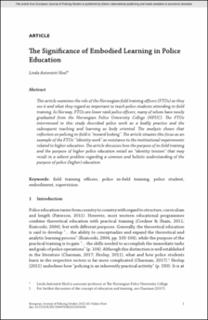| dc.contributor.author | Hoel, Linda Antoniett | |
| dc.coverage.spatial | Norge | en_US |
| dc.date.accessioned | 2023-01-05T13:57:02Z | |
| dc.date.available | 2023-01-05T13:57:02Z | |
| dc.date.issued | 2022 | |
| dc.identifier.issn | 2295-3523 | |
| dc.identifier.uri | https://hdl.handle.net/11250/3041313 | |
| dc.description.abstract | This article examines the role of the Norwegian field training officers (FTOs) as they see it and what they regard as important to teach police students attending in-field training. In Norway, FTOs are lower rank police officers, many of whom have newly graduated from the Norwegian Police University College (NPUC). The FTOs interviewed in this study described police work as a bodily practice and the subsequent teaching and learning as body oriented. The analysis shows that reflection on policing in-field is “inward looking”. The article situates this focus as an example of the FTOs’ “identity work” as resistance to the institutional requirements related to higher education.
The article discusses how the purpose of in-field training and the purpose of higher police education entail an “identity tension” that may result in a salient problem regarding a common and holistic understanding of the purpose of police (higher) education. | en_US |
| dc.language.iso | eng | en_US |
| dc.publisher | Maklu-Uitgevers | en_US |
| dc.subject | police students | en_US |
| dc.subject | politistudenter | en_US |
| dc.subject | field training | en_US |
| dc.subject | felttrening | en_US |
| dc.subject | embodiment | en_US |
| dc.subject | supervision | en_US |
| dc.subject | veiledning | en_US |
| dc.subject | police training | en_US |
| dc.subject | politiutdanning | en_US |
| dc.title | The significance of embodied learning in police education | en_US |
| dc.type | Peer reviewed | en_US |
| dc.type | Journal article | en_US |
| dc.description.version | publishedVersion | en_US |
| dc.source.journal | European Journal of Policing Studies | en_US |
| dc.identifier.doi | 10.5553/EJPS/2034760X2022001004 | |
